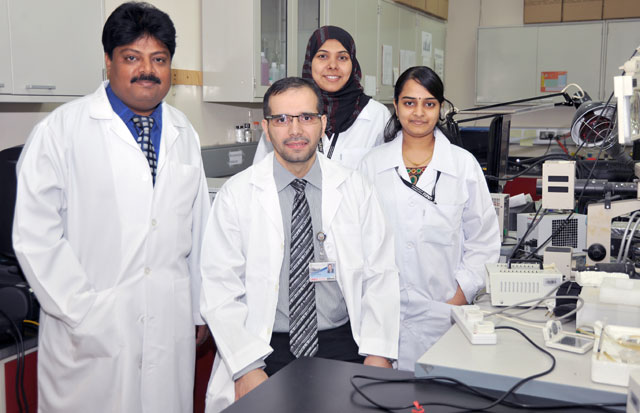Hamdan Medical Award warns of the Diesel exhaust particles Diabetics have increased susceptibility to respiratory and cardiovascular diseases
07 July 2013
Supported by Sheikh Hamdan Bin Rashid Al Maktoum Award for Medical Sciences, Prof. Abderrahim Nemmar, Dept. of Physiology in the College of Medicine and Health Sciences, UAE University, has finalized his research project entitled "Mechanisms of adverse pulmonary and cardiovascular effects of particulate air pollution". The results of his project were recently published in notorious peer-reviewed international scientific journals, namely "Particle and Fibre Toxicology" and "Toxicology Letters".
Prof. Nemmar announced: "Our studies demonstrate an increase of susceptibility to respiratory and cardiovascular effects of diesel exhaust particles (DEP) in Type 1 diabetic mice compared to healthy ones. We found that acute exposure (24 hours) of mice to DEP induces pulmonary and systemic inflammation and oxidative stress, liver dysfunction and thrombotic (coagulation) events in cerebral micro vessels and that these effects are aggravated in diabetic mice"
"DEP that we used have been analyzed by transmission electron microscopy which showed the presence numerous small aggregates of carbonaceous particles, and substantial amount of ultrafine (nano)-sized particle (less than 100 nm) aggregates were seen. Most of the observed aggregates were <1 µm in the largest diameter. The inhaled nanosized particles can penetrate deeply into the respiratory tract and pass into the systemic circulation, and reach various organs", he said.
Prof. Nemmar mentioned "In order to confirm the blood coagulation results observed in vivo in mice, we performed in vitro investigation to test the direct impact of DEP on platelet aggregation in whole blood. To this end, blood samples from healthy and diabetic mice were exposed to DEP, and platelet aggregation was monitored. We found a pronounced increase in platelet aggregation in blood obtained from diabetic mice compared to the healthy ones. This in vitro finding can explain the increase of susceptibility to thrombosis in cerebral microvessels that we observed in vivo in mice".
"These studies have shown that respiratory, systemic and coagulation events are aggravated by type 1 diabetic mice, , acutely exposed to DEP and have described the possible mechanisms for these actions that may also be relevant to the exacerbation of cardiopulmonary morbidity accompanying particulate air pollution in diabetic patients", he reported.
Commenting on the study, Prof. Najib Al Khaja, Secretary General of Sheikh Hamdan Bin Rashid Al Maktoum Award for Medical Sciences, said that he is proud with these important results which reflect the keenness of the award on selecting the important research projects for funding, especially the projects whose results could contribute in improving the health sector and the public health.
"The research is an alarming bell of the dangerous pollutants which get out from the heavy trucks that use Diesel because it is cheaper than other kinds of fuel such as gasoline. The bad impact of Diesel Exhaust Particles is not limited to the lung dysfunctions, the first organ that air passes by while breathing, but it affects all the body parts", he added.
"Concerted efforts are needed to reduce the air pollution with such dangerous elements, either by working on reducing the rates of the consumption of diesel by using other kinds of fuel, or through reducing the traffic of heavy trucks in the residential areas", Al Khaja said.
Al Khaja praised the great attention of the UAE wise leadership to develop the sustainable energy, such as solar and wind energy, which contribute in upgrading the public health and preventing many serious and chronic diseases. Also, he mentioned to the importance of studying how to expand the usage of the sustainable energy sources.

